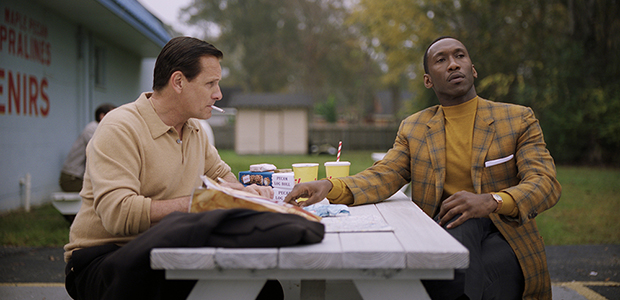Green Book tries to tackle the weighty issue of racism that was prevalent during the 1960’s, most prominently in the American South, by using an uplifting story of friendship and a light, comedic tone, but is somewhat undone by a screenplay that pontificates and a narrative, that while entertaining, seems to airbrush over the complexities of the situation.
The title comes from a handbook that was circulated amongst the African American community during that era, which listed establishments where they could reside or dine during trips – a sort of tripadvisor for the racially subjugated. One of the recipients of the book is Tony Lip, a loud, racist, down on his luck and out of work Italian American who’s looking for work and finds himself interviewing for the position of a driver for a well regarded African American pianist. The sophisticated, erudite Doctor Don Shirley eventually hires him to be driven cross country while playing at concerts which sets into motion the bulk of the film – a reverse Driving Miss Daisy served as a road trip.
The juxtaposition of Tony and Don is what gives the film its main thrust and a lot of its laughs. As people, they are representative, somewhat deliberately it seems, of two extremes: Tony a brash, boisterous, short-tempered simpleton with a ravenous appetite (Mortensen sports a massive belly) is a family man who just wants to put food on the table while Don dresses with finesse, speaks with clairvoyance and authority and is principled but seemingly alone. Any film that begins with two people who don’t necessarily like each other but are forced to be in each others presence eventually leads to them reconciling and opening up and Green Book projects and then effortlessly continues on exactly this track. That in itself isn’t cause for criticism because it’s done with genuine humour that truly relies on both Mortensen (despite sounding like a hammy De Niro impersonator at times) and especially Mahershala Ali to be expert thespians.
The films deft comedy shouldn’t be a surprise given its helmed by Peter Farrelly, one half of the Farrelly brothers. What is not surprising is, despite the “based on a true story” disclaimer at the start, it doesn’t take too long or require any comparison with the actual events (of which there is no documented source or known reference) to realise that a lot of what we see is unsubtle and clichéd. The Farrelly’s always had a way with providing sharp insights on human behavior even while being seemingly lowbrow with the content, but that worked because there was never any seriousness to their subject or approach. Understandably, there is rarely anything subtle about racism in most forms, and in a film with a lighter tone, perhaps the scene where Don is introduced for the first time to the flavoursome wonders of Fried Chicken or the majesty of blues music would have had more comic irony, that isn’t the case here, where those scenes play out too long and in, well, somewhat bad taste.
As films like these often do, it offers a rather expectant transformation of the initial relationship between Tony and Don but what’s curious and somewhat perplexing is that Tony is the one who’s transformed into someone who comes to ultimately respect a coloured man while Don remains, for the viewers at least, somewhat of an enigma. If the examination of these elements is left out and the film viewed purely based on its engineered screenplay, Green Book is a feel good oversimplification when it could have been much more.
Rating: 




